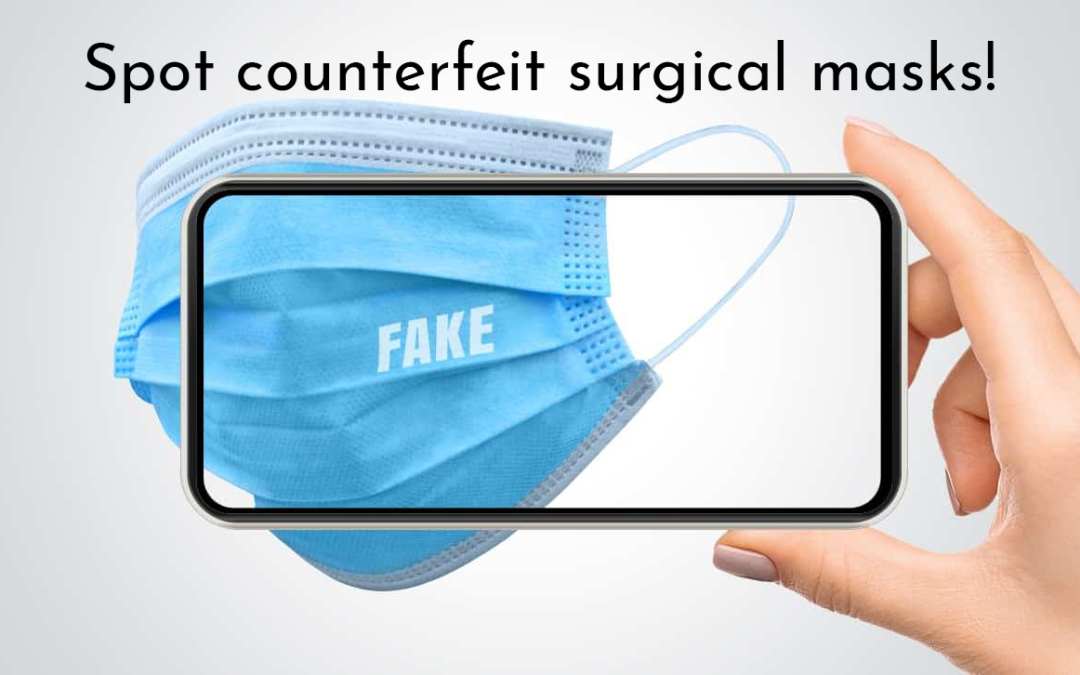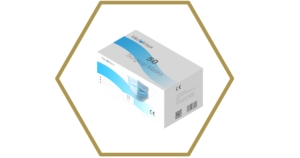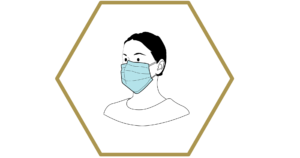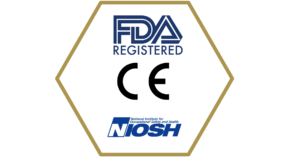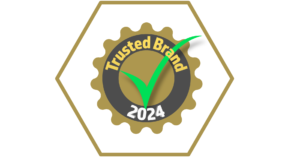The COVID-19 pandemic kickstarted an explosion in the demand for surgical masks which resulted in crippling shortages. Gripped with fear, people hoarded what they could find and even started stockpiling N95 masks that should ideally have been reserved for use by healthcare workers. Counterfeit masks soon flooded the market to fulfill the rising demand.
The menace of counterfeit surgical masks affected not just unsuspecting individuals but even governments. As counterfeiters evolve and get better at replicating genuine products and their anti-counterfeiting measures, it’s becoming increasingly difficult to distinguish fakes from originals. The life-threatening impact of fake surgical masks makes the problem even more critical.
Besides the health and safety dangers, counterfeit masks also affect the revenues and brand value of legitimate manufacturers as consumers unknowingly spend on fakes and the brand reputation of genuine manufacturers is tarnished in the case of an incident.
The need of the hour is to invest in tamper-proof counterfeiting protection that is impossible to replicate and can be used by consumers to easily identify fake surgical masks.
Surgical Masks and Their Importance
Surgical masks are disposable face masks that are designed to protect the wearer’s nose and mouth from droplets, splashes, and sprays that may contain germs, viruses, or bacteria. These masks are commonly used in healthcare settings to help prevent the spread of infectious diseases.
Masks are designed to protect both the wearer and others around them by filtering out droplets and large particles in the air when they talk, cough, or sneeze. In case a person is infected with a contagious disease, the surgical mask protects others around the person. That makes masks essential for the health of the society.
In terms of materials, surgical masks differ from regular cloth masks. They usually consist of three primary layers — a non-woven outer layer, a melt-blown middle layer, and an absorbent inner layer. The melt-blown layer is designed to filter out small particles, while the outer and inner layers together provide added protection and comfort.
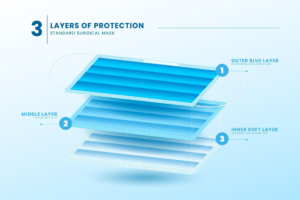
Image source: Image by pikisuperstar on Freepik
The COVID-19 pandemic contributed to the heightened knowledge and use of surgical masks as they were required in public settings and healthcare facilities to help prevent the spread of the virus. They are particularly effective in healthcare settings where healthcare workers come into close contact with patients who may be infected with a contagious disease.
In other settings such as public transportation, schools, and businesses, surgical masks help reduce the transmission of many other respiratory infections like influenza, various flu, and common cold.
Problem of Counterfeit Surgical Masks
As the world started to cope with the spread of the COVID-19 virus, it soon became clear that there just weren’t enough surgical masks to go around. Both frontline healthcare workers and the general public needed a regular supply of genuine surgical masks to protect themselves and limit the spread of the virus. And as supply ran out, counterfeiters jumped on the opportunity to benefit from the situation.
In the wake of the federal government struggling to provide surgical masks and PPE kits to the states, many states decided to purchase medical equipment themselves from foreign vendors. Internationally, persistent shortages led to countries banning exports of surgical masks and other medical equipment. The globally prevalent crisis created a hotbed for counterfeiters to inject fake surgical masks into the supply chain that were often missed by investigators. Reports started to come in from the US where even governments unknowingly bought millions of fake N95 masks.
Authorities have tried to clamp down on criminals selling fake surgical masks and other medical devices. In March 2020, Interpol led a global crackdown on the online sale of fake medical products. Out of nearly 2,000 online links advertising COVID-19-related medical devices, 600 were for the sale of counterfeit surgical masks. Around six months later, nearly half a million counterfeit N95 masks were seized at Chicago’s O’Hare International Airport.
Similar cases were reported from across the globe as counterfeiters kept risking people’s lives to make a profit.
Dangers of Counterfeit Surgical Masks for Healthcare Workers
The problem of counterfeit surgical masks is a critical issue as it can compromise the safety of healthcare workers who desperately rely on these masks in their war against infectious diseases that are not limited to COVID-19.
Counterfeit masks don’t provide the same level of protection as genuine surgical masks. They may not have the same level of filtration or be made with the same materials as genuine surgical masks, which increases the risk of infection. Many fake surgical masks are also found to have toxic materials like formaldehyde, phthalates, and fluorocarbons that can cause a spate of other medical issues like skin irritation, breathing problems, and more.
Additionally, counterfeit surgical masks may be sold at a lower price, making them more attractive to individuals and hospitals who think they’re purchasing the real thing. This can lead to a false sense of security for the entire populace and put people at an increased risk of exposure. The production and distribution of counterfeit surgical masks also hurt legitimate manufacturers who strive to meet the demand for high-quality masks.
Counterfeit masks result in huge health safety and economic losses and represent one of the worst criminal practices that’s as hard to tackle as it’s prevalent.
How to Identify Counterfeit Surgical Masks
Considering the degree to which counterfeit surgical masks have penetrated our lives, we need to be able to identify them to better protect ourselves. There are some basic tips that can help you distinguish fake masks from genuine ones, at least to an extent:
Check the packaging: Genuine surgical masks usually come in sealed packaging with clear labelling that includes the manufacturer’s name, address, and contact details. Check the packaging for any signs of tampering, such as broken seals, torn packaging, or missing labels.
Check the quality of the material: Authentic masks are made from high-quality materials that are durable, flexible, and resistant to tears and punctures. Counterfeit masks are often made from cheaper materials that are thinner and less durable, which can indicate their counterfeit nature.
Check the fit: Legitimate surgical masks are designed to fit snugly around the nose and mouth, with no gaps between the mask and the face. Counterfeit masks might not fit properly, which could allow particles to enter through the gaps. An ill-fitting mask might indicate that it’s a counterfeit product.
Check the certification: Look for certifications from reputable organizations such as the FDA, NIOSH, or CE. These certifications indicate that the mask has been tested to meet the appropriate safety standards.
Check the price: If the price of the mask seems too good to be true, it probably is. Counterfeit masks are often sold at a much lower price than genuine masks, so be wary of any deals that seem too good to be true.
Check the seller: Purchase masks from reputable sellers who have a track record of selling authentic masks. Avoid buying masks from unknown or unverified sources, especially those that are sold on social media or online marketplaces.
3M, the global health care and worker safety products manufacturer, also released suggestions to educate consumers on how to identify fake masks. These suggestions include visually inspecting the masks and the packaging, purchasing them only from 3M-authorized distributors, and using anti-counterfeit authentication present on some of the models.
But none of these visual verification methods can guarantee that you’re using a genuine surgical mask. As counterfeiters have gotten increasingly better in making their products look real, often consumers are fooled into believing they’ve purchased genuine masks. Even visible anti-counterfeiting solutions can easily be replicated by malicious parties to pass off their products as genuine.
Covert Anti-Counterfeiting for Effective Protection
To make anti-counterfeiting methods work as intended, manufacturers need to implement advanced and tamper-proof solutions. This protection comes in the form of covert methods that aren’t visible on the product or the packaging but can still be used to verify the product’s authenticity.
One such innovative solution is AlpVision’s Cryptoglyph, a digital authentication technique that introduces invisible micro-defects on the product packaging to create a unique and tamper-proof signature. Cryptoglyph can be easily applied to existing packaging by manufacturers without any need to modify their packaging printing processes. Consumers can verify surgical masks instantly by using their smartphone to scan the packaging imprinted with Cryptoglyph.
With no additional printing costs and verification enabled by a smartphone app, Cryptoglyph is an effective and cost-effective anti-counterfeiting solution that can combat the problem of counterfeit surgical masks. Counterfeiters cannot replicate this technology as the imprints are invisible and furthermore, accessing the technology to create a similar solution is not a prudent financial undertaking for them.
Instant Surgical Mask Verification With Cryptoglyph
The plague of fake surgical masks and other medical equipment will not disappear overnight but manufacturers and consumers can together adopt more effective solutions to protect against it. Solutions like Cryptoglyph already protect billions of products around the world from counterfeiting.
And with increased awareness among both brands and consumers about the existence of such advanced solutions, we can begin to put a significant dent in the global counterfeit trade.
Contact us today to explore counterfeiting solutions tailored to your brand and needs.

